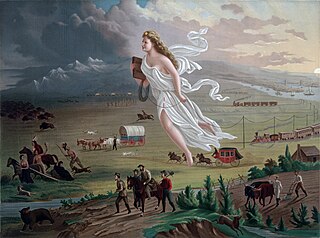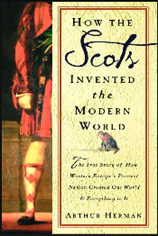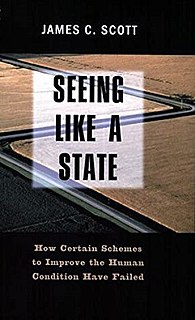Capitalism is an economic system based on the private ownership of the means of production and their operation for profit. Central characteristics of capitalism include capital accumulation, competitive markets, a price system, private property and the recognition of property rights, voluntary exchange and wage labor. In a capitalist market economy, decision-making and investments are determined by every owner of wealth, property or production ability in capital and financial markets whereas prices and the distribution of goods and services are mainly determined by competition in goods and services markets.
World history or global history as a field of historical study examines history from a global perspective. It emerged centuries ago; leading practitioners have included Voltaire (1694-1778), Hegel (1770-1831), Karl Marx (1818-1883) and Arnold J. Toynbee (1889-1975). The field became much more active in the late 20th century. It is not to be confused with comparative history, which, like world history, deals with the history of multiple cultures and nations, but does not do so on a global scale. World history looks for common patterns that emerge across all cultures. World historians use a thematic approach, with two major focal points: integration and difference.

The Clash of Civilizations is a thesis that people's cultural and religious identities will be the primary source of conflict in the post-Cold War world. The American political scientist Samuel P. Huntington argued that future wars would be fought not between countries, but between cultures. It was proposed in a 1992 lecture at the American Enterprise Institute, which was then developed in a 1993 Foreign Affairs article titled "The Clash of Civilizations?", in response to his former student Francis Fukuyama's 1992 book, The End of History and the Last Man. Huntington later expanded his thesis in a 1996 book The Clash of Civilizations and the Remaking of World Order.

A paperback, also known as a softcover or softback, is a type of book characterized by a thick paper or paperboard cover, and often held together with glue rather than stitches or staples. In contrast, hardcover or hardback books are bound with cardboard covered with cloth, plastic, or leather. The pages on the inside are made of paper.

Robert L. Heilbroner was an American economist and historian of economic thought. The author of some 20 books, Heilbroner was best known for The Worldly Philosophers: The Lives, Times and Ideas of the Great Economic Thinkers (1953), a survey of the lives and contributions of famous economists, notably Adam Smith, Karl Marx, and John Maynard Keynes.

Simon James Holliday Gray was an English playwright and memoirist who also had a career as a university lecturer in English literature at Queen Mary, University of London, for 20 years. While teaching at Queen Mary, Gray began his writing career as a novelist in 1963 and, during the next 45 years, in addition to five published novels, wrote 40 original stage plays, screenplays, and screen adaptations of his own and others' works for stage, film, and television and became well known for the self-deprecating wit characteristic of several volumes of memoirs or diaries.
Psychometry, also known as token-object reading, or psychoscopy, is a form of extrasensory perception characterized by the claimed ability to make relevant associations from an object of unknown history by making physical contact with that object. Supporters assert that an object may have an energy field that transfers knowledge regarding that object's history.

John Nicholas Gray is an English political philosopher with interests in analytic philosophy and the history of ideas. He retired in 2008 as School Professor of European Thought at the London School of Economics and Political Science. Gray contributes regularly to The Guardian, The Times Literary Supplement and the New Statesman, where he is the lead book reviewer. He is an atheist.

Progress is the movement towards a refined, improved, or otherwise desired state. In the context of progressivism, it refers to the proposition that advancements in technology, science, and social organization have resulted, and by extension will continue to result, in an improved human condition; the latter may happen as a result of direct human action, as in social enterprise or through activism, or as a natural part of sociocultural evolution.
André Deutsch was a Hungarian-born British publisher who founded an eponymous publishing company in 1951.
Raveendra Nath "Ravi" Batra is an Indian-American economist, author, and professor at Southern Methodist University. Batra is the author of six bestselling books, two of which appeared on The New York Times Best Seller list, with one reaching #1 in late 1987. His books center on his idea that financial capitalism breeds excessive inequality and political corruption which inevitably succumbs to financial crisis and economic depression. In his works, Batra proposes an equitable distribution system known as Progressive Utilization Theory (PROUT) as a means to not only ensure material welfare but also to secure the ability of all to develop a full personality.
Ian Jack is a British journalist and writer who has edited the Independent on Sunday and the literary magazine Granta and now writes regularly for The Guardian.
Sofka Zinovieff is a British author and journalist.

The Western world, also known as the West, refers to various regions, nations and states, depending on the context, most often consisting of the majority of Europe, Northern America and Australasia. The Western world is also known as the Occident, in contrast to the Orient or Eastern world. It might mean the Northern half of the North–South divide. Western culture is commonly said to include: Australia and New Zealand, Canada, all European member countries of the EFTA and EU, the European microstates, the NATO military alliance, the United Kingdom, and the United States.

Western culture, sometimes equated with Western civilization, Occidental culture, the Western world, Western society, and European civilization, is the heritage of social norms, ethical values, traditional customs, belief systems, political systems, artifacts and technologies of the Western World that originated in or are associated with Europe. The term also applies beyond Europe to countries and cultures whose histories are strongly connected to Europe by immigration, colonization, or influence. For example, Western culture includes countries in Northern America, such as Canada and the United States, or Australasia, such as Australia and New Zealand, whose language and demographic ethnicity majorities are of European descent without indigenous influence. Western culture is most strongly influenced by the Greco-Roman and Christian cultures.

How the Scots Invented the Modern World: The True Story of How Western Europe's Poorest Nation Created Our World & Everything in It is a non-fiction book written by American historian Arthur Herman. The book examines the origins of the Scottish Enlightenment and what impact it had on the modern world. Herman focuses principally on individuals, presenting their biographies in the context of their individual fields and also in terms of the theme of Scottish contributions to the world.

Cultural globalization refers to the transmission of ideas, meanings, and values around the world in such a way as to extend and intensify social relations. This process is marked by the common consumption of cultures that have been diffused by the Internet, popular culture media, and international travel. This has added to processes of commodity exchange and colonization which have a longer history of carrying cultural meaning around the globe. The circulation of cultures enables individuals to partake in extended social relations that cross national and regional borders. The creation and expansion of such social relations is not merely observed on a material level. Cultural globalization involves the formation of shared norms and knowledge with which people associate their individual and collective cultural identities.
World domination is a hypothetical power structure, either achieved or aspired to, in which a single political authority holds the power over all or virtually all the inhabitants of the planet Earth. Various individuals or regimes have tried to achieve this goal throughout history, without ever attaining it. The theme has been often used in works of fiction, particularly in political fiction, as well as in conspiracy theories, particularly those fearing the development of a "New World Order" involving a world government of a totalitarian nature.

Seeing Like a State: How Certain Schemes to Improve the Human Condition Have Failed is a book by James C. Scott critical of a system of beliefs he calls high modernism, that centers around confidence in the ability to design and operate society in accordance with scientific laws. It was released in March 1998, with a paperback version in February 1999. The book catalogues schemes which states impose upon populaces that are convenient for the state since they make societies "legible", but are not necessarily good for the people. For example, census data, standardized weights and measures, and uniform languages make it easier to tax and control the population.










